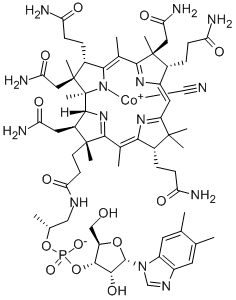Description
Cyanocobalamine is a synthetic compound of vitamin B12 used to treat vitamin deficiencies. Chemically, it is classified as a "corrinoid," representing a crystallizable cobalt complex. Cyanocobalamine is approved by the United States Food and Drug Administration (FDA) for pernicious anemia, malabsorption, atrophic gastritis, gastrectomy, Helicobacter pylori infection, and other conditions.
Mechanism of action
Cyanocobalamine absorption occurs through the small intestine after binding to intrinsic factors and other cobalamin-binding proteins. When administered via the parenteral route, the vitamin reaches the blood immediately. In the blood, vitamin B12 attaches to plasma proteins. Tissues absorb vitamin B12 by specific B12 binding proteins, transcobalamin I and II, facilitating transport into cells. Most of the vitamin is stored in the liver. Vitamin B12 is essential for DNA synthesis and energy production, particularly in erythroid progenitor cells.
Side effects
Common side effects include
joint pain,
dizziness,
headache, and
cold symptoms.
Other side effects include:
severe allergic reactions,
diarrhea, and
heart failure.

